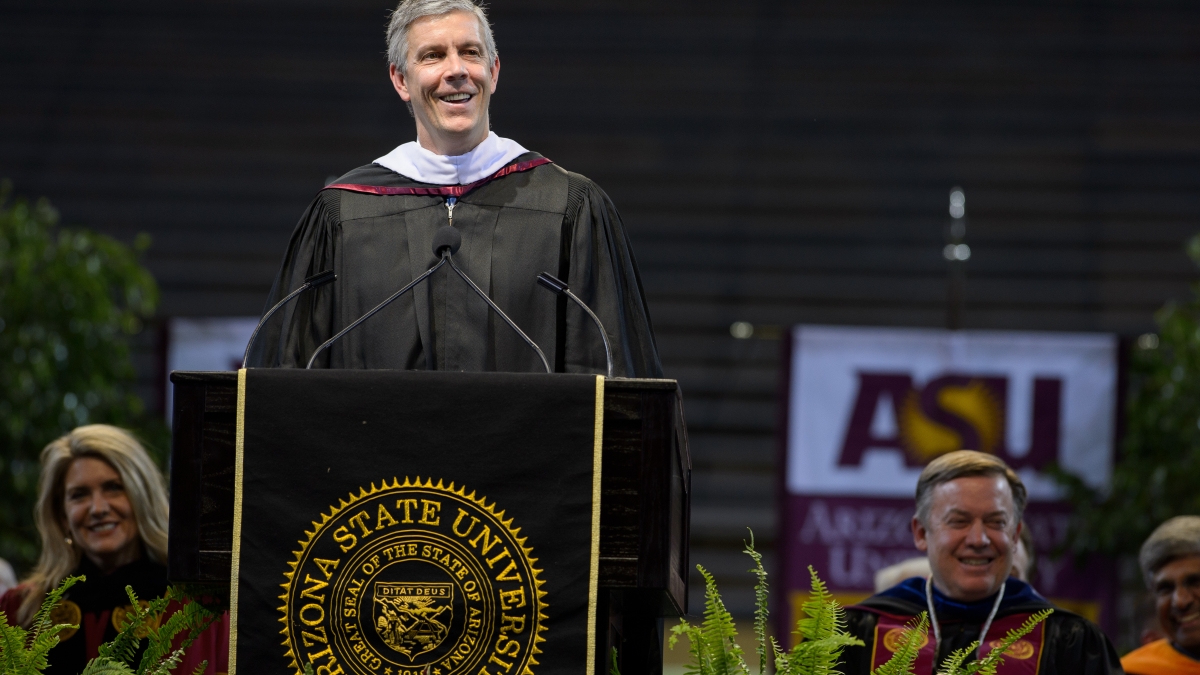US Secretary of Education urges ASU grads to be change agents

In a spirited address to thousands of graduating students at Arizona State University's 2014 undergraduate commencement, which took place May 14 in Sun Devil Stadium, U.S. Secretary of Education Arne Duncan called for excellence in higher education through inclusion, instead of exclusion.
Duncan asked graduates to take their ASU education to heart, and combine equity, diversity and creativity with world-class research, innovation, entrepreneurship and community service. He also encouraged them to reflect upon their college experiences, friendships and education, and to pay it forward and be change agents.
“You’ll look back and remember moments and traditions that were special," he said. "The education that you received will be part of you forever and will empower you to face challenges. As you leave here, strive to lead a life of consequence, in ways big and small.”
More than 12,000 ASU students have or are graduating May 12-16, many with degrees in two or more majors.
Earlier that evening, Secretary Duncan met with members of the current class of ASU’s President Barack Obama Scholars, a scholarship program that combines financial aid with mentorship to allow students from varied backgrounds transition smoothly to college. The program was launched in 2009 to coincide with President Obama’s visit to ASU.
In addition to the Arizona Board of Regents and ASU leadership, Duncan was joined on the stage by honorary degree recipients Freeman Hrabowski, III, president of the University of Maryland-Baltimore County, who has championed science and technology, as well as minority education; Nobel Prize-winning economist Joseph Stigltiz from Columbia University, who is one of the world’s top authorities on economics theories that include welfare economics, income and wealth distribution; and environmental science pioneer and MacArthur Fellowship winner Pamela Matson from Stanford University.
Conservationist and philanthropist Julie Ann Wrigley received the University Medal of Excellence from ASU President Michael M. Crow.
The evening began on a light note with Duncan holding up the "Pitchfork" and making a few jokes at the expense of ASU’s peer institutions. However, it soon turned introspective with Duncan asking graduates to ask themselves what they plan to do with the degree that they’ve worked so hard to earn.
Reflecting upon his own journey from playing basketball in college to becoming the CEO of Chicago Public Schools to, more recently, being named the U.S. Secretary of Education in 2009, Duncan stressed the importance of persistence, as well as of embracing responsibility and innate leadership abilities.
The address also lauded ASU’s redesign of traditional academic departments into interdisciplinary learning powerhouses, and its education values that instill adaptability, creativity and the drive that enables students to pursue their calling – all qualities that were emphasized by President Crow during the ceremony.
“As empowered learners and principal products of a New American University, ASU students can blend new concepts and experiences into ideas that drive progress and are much more impactful,” Crow said.
In the last decade, ASU has increased the number of degrees awarded by 60 percent, while seeing a simultaneous increase in the diversity of its graduates. More Native American and Hispanic students graduate from ASU than from any of the 62 research universities in the Association of American Universities. ASU is sixth among the 62 universities in graduating African-American students.
The impact of ASU students on regional and global communities also was noted by the nation’s top educator, who commended them for engaging in hundreds of thousands of hours of community service and egged them on to “dream it, do it” as per ASU’s mission.
“In the global economy, it is not just knowledge and ability to master a subject that determine your success, as important as they are,” Duncan said. “Your ability to be a lifelong learner will determine how you fare in the job market and in life.
“Chasing your dream is about so much more than finding a job or paying off your college debt, both of which, I know, are on many of your minds today," Duncan said. “But in the long term, you’ll know that you are pursuing your passion if it is what you would want to do every day, even if you weren’t getting a paycheck.”